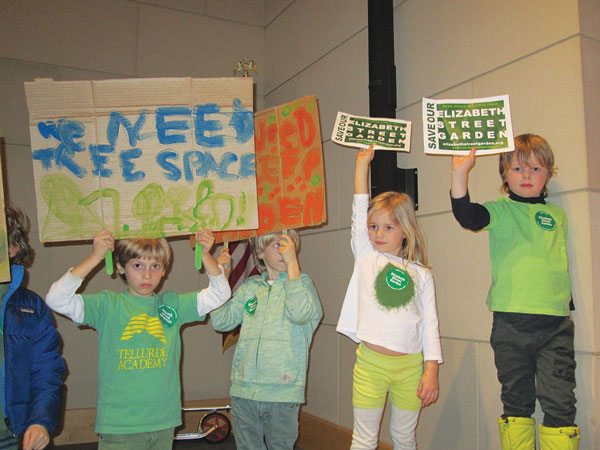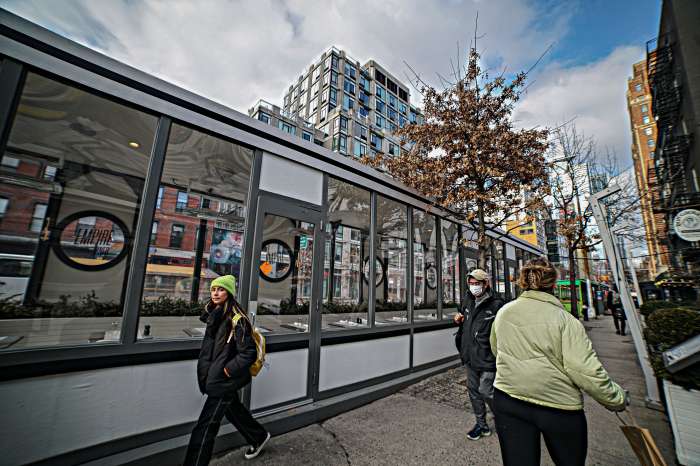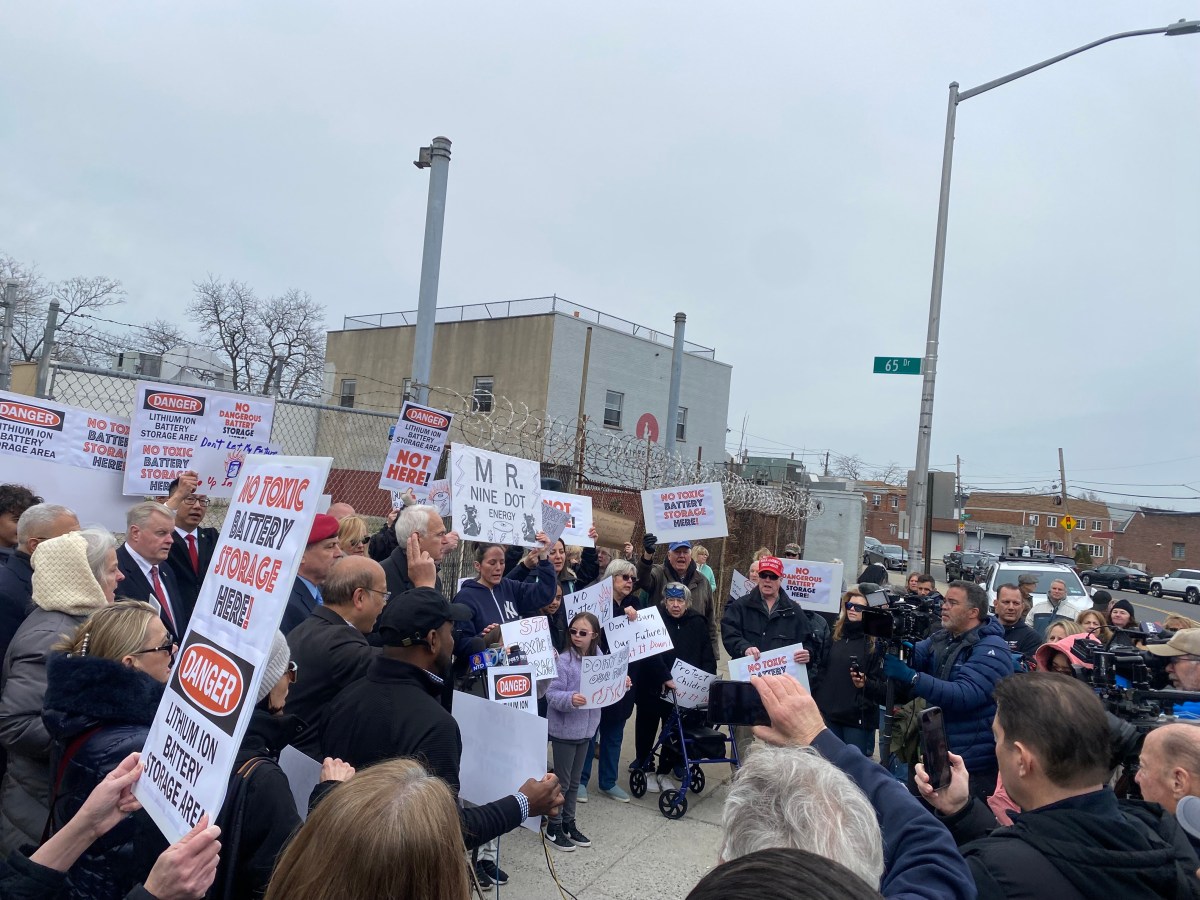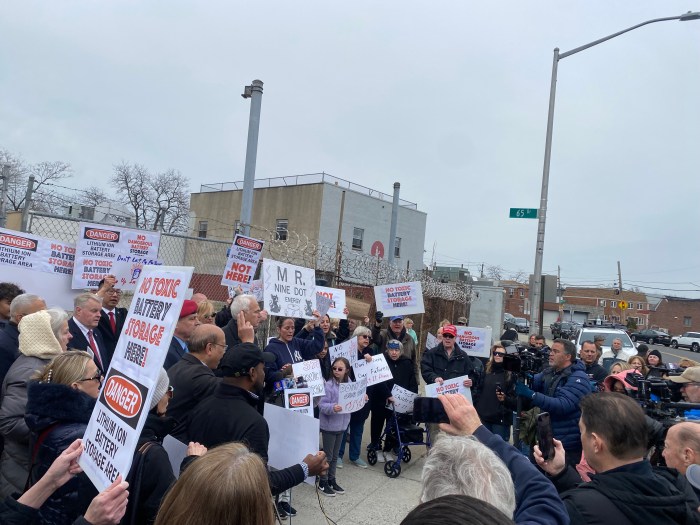
We wish we didn’t have to write this editorial. We wish Mayor Bill de Blasio — who, when he ran for election the first time, pledged to heed the community on development issues — would listen now.
As you might have guessed, we’re writing about the Elizabeth St. Garden. Yes, admittedly, we might just as well be writing about Rivington House, too, unfortunately. Clearly, there is a pattern here…and it’s troubling. Backroom deals hatched in secrecy never turn out well.
A new nonprofit group has now been formed to take over the Elizabeth St. Garden and its programing. The group, Elizabeth Street Garden, Inc., supplants the Friends of Elizabeth Street Garden, the nonprofit that has been programming the garden the past several years.
The main reason the new nonprofit was created and why it assumed control of the garden was for one purpose: to sue the city.
Enough cannot be said about the work of the Friends in activating this beautiful — but previously not too accessible — space and transforming it into an amazing community hub, for everyone from little kids to seniors to enjoy. The garden today has a mailing list of 6,000 supporters.
The Friends’ Jeannine Kiely, Elizabeth Hellstrom and all the other volunteer gardeners deserve tremendous credit for all their effort to show us just how essential open space is to this corner of park-starved Little Italy and Soho.
However, as much as this may be sacrilege, we feel we have to say it: We think E.S.G. has made the right move in assuming leadership of the garden, at this point. And we do support the idea of filing suit. In short, what other option is there?
Yes, the Friends continue to hold protests — complete with a “Reveille”-playing bugler — to try to “wake up” the seemingly deaf-eared mayor to the importance of saving this wonderful open space. That spirit and enthusiasm is great, and it’s absolutely critical to keep showing how much support there is for the garden.
But, let’s be honest, de Blasio isn’t “changing his tune,” so to speak. As we heard him say at the candidates’ night on Tuesday hosted by local Democratic political clubs, affordable housing is his top priority — and none more so than senior housing. He said much the same at Chelsea town hall meeting in March, but he was even firmer about it on Tuesday night. In other words, his position is not weakening — but just the opposite, in fact, it’s seemingly becoming even more hardened and more entrenched.

The mayor is willing to save one-quarter of the garden — 5,000 square feet — but obviously that’s a far cry from the unique, majestic 20,000-square-foot block-through space that is there now. The mayor calls this a “compromise,” but once a shovel goes in the ground, there will be no compromise — it will be the end of the garden.
The new nonprofit has a three-member board, including Joseph Reiver, the son of Allan Reiver, the gallery owner who created the garden more than 25 years ago and continues to be the leaseholder of the city-owned space. The other two board members are a leading New York City community gardens activist, along with a local woman in her 80s who suffers from painful arthritis and says the garden’s being nearby is, for her, a critical part of her relaxation and well-being.
All the area’s local politicians — save for Councilmember Margaret Chin, who supports the housing project to the hilt, and, of course, de Blasio — back saving the full garden and relocating the housing to an alternative site on Hudson St. that Community Board 2 has identified. But the mayor doesn’t care. So, clearly, community opposition and political opposition seemingly are not affecting him. Again, as a result, another course of action must be taken.
Developers have already responded to a request for proposals to build the senior housing project, and the R.F.P. is now closed.
The current chairperson of C.B. 2 has “condemned” E.S.G. for taking over the space. Frankly, though, we respectfully disagree. They were left no option. Over the course of a month, the Friends were asked repeatedly to join the lawsuit, but never responded, apparently feeling that suing wouldn’t work. One E.S.G. member told us they just felt that F.E.S.G. wasn’t being aggressive enough, and that’s what it sounds like to us.
In short, this is a new phase of the fight — it’s now time to transition to taking legal action. It’s time to get like one of the garden’s lions, and bare some teeth.
Of course, it’s true, a lawsuit may not succeed. But at least it’s a foot in the door. Sure, there are no guarantees, but once you get in court, you never know what can happen. Allan Reiver — who would be a plaintiff on the suit, along with, likely, E.S.G. and some others — says there are some very compelling legal strategies they are investigating right now as their legal case is being prepared. Among his many hats, Reiver is actually a lawyer himself, by the way.
Yes, a lawsuit is expensive, but apparently Reiver is well-financed enough that he can wage one. As Sean Sweeney, director of the Soho Alliance, has told us, the alliance can’t sue over every issue — they have to pick and choose, since they don’t have unlimited funds. But saving this priceless garden is worth the cost of arguing the case in court.
Again, a lawsuit is worth a try. And, as of now, it seems like the only option.
What exactly IS the other option — wait around until the bulldozers are revving up and ready to raze the garden?
Of course, it’s unfortunate that the Friends can’t continue programming the garden, at least for now. They have done an amazing job. Joseph Reiver and the new board will do their best to try to keep the garden’s calendar of activities at the same high level.
But let’s face it: Without a garden, there’s no programming. Period. So the priority must first be to try to save the garden. The other way wasn’t working.
So, let’s do it! Go ahead and sue! Our tin-earred mayor has forced this.





































